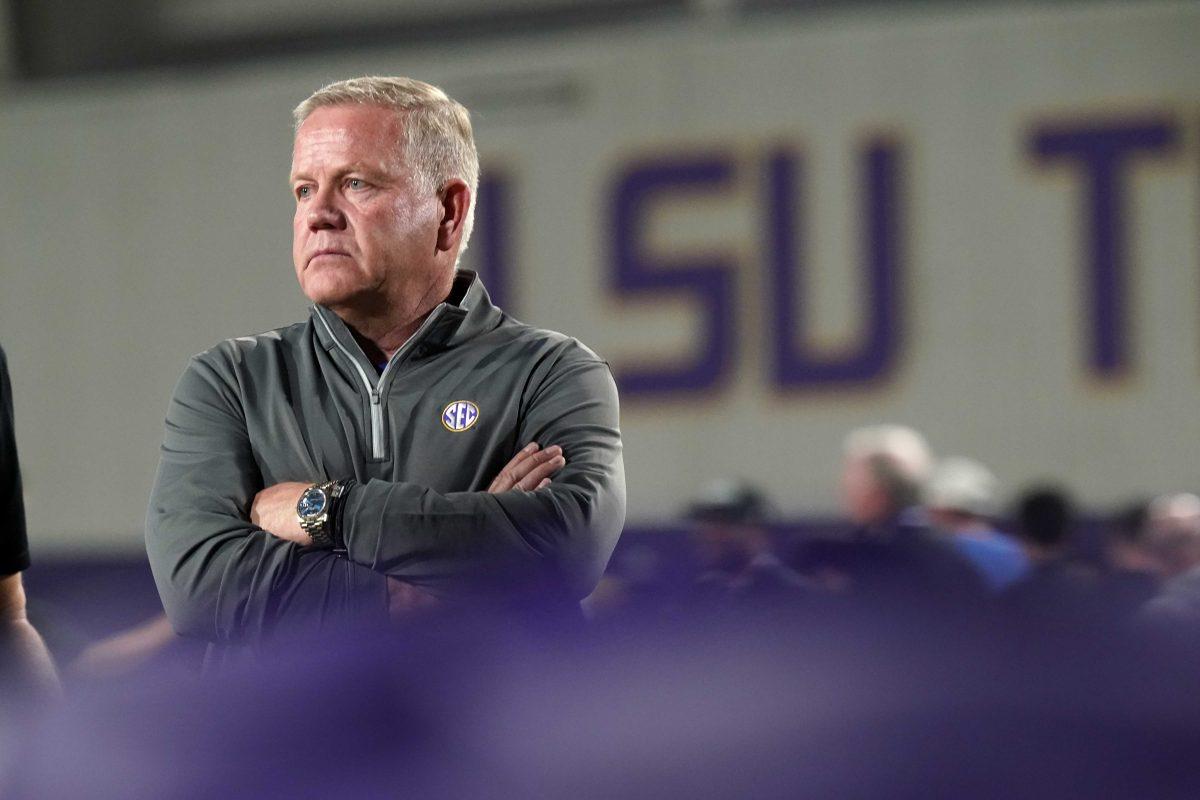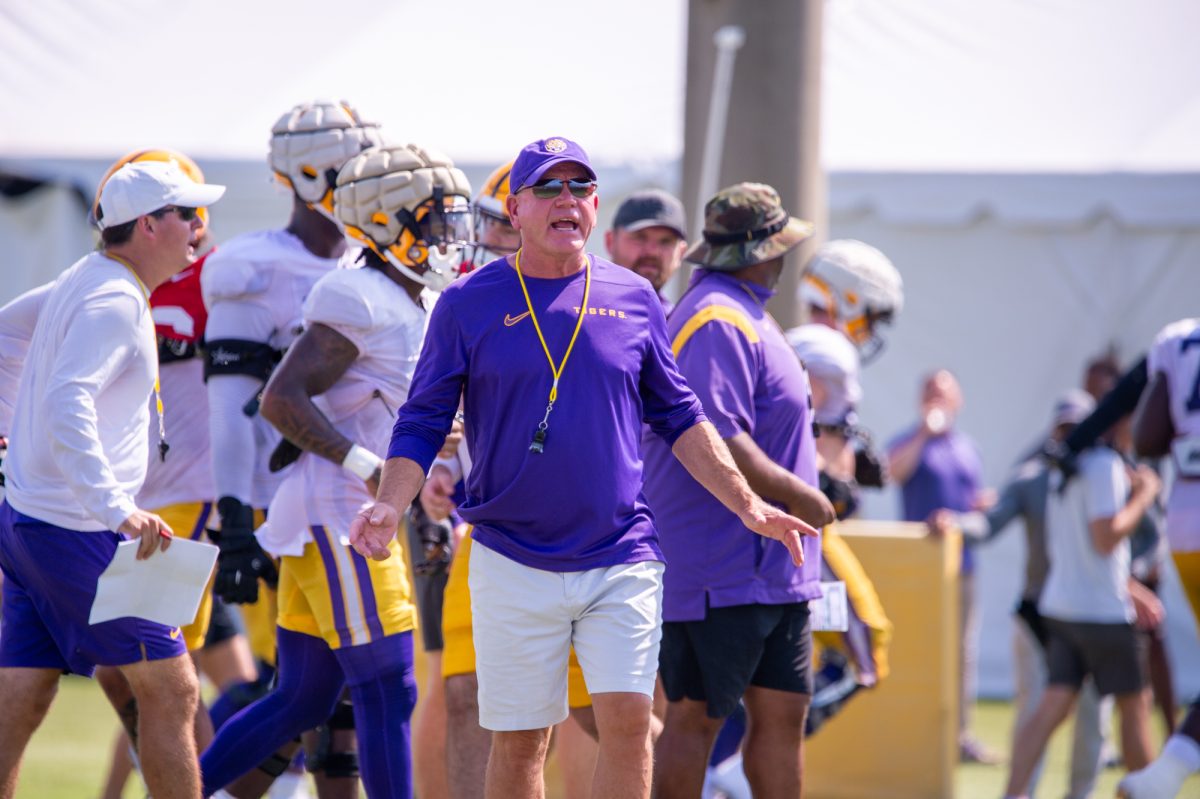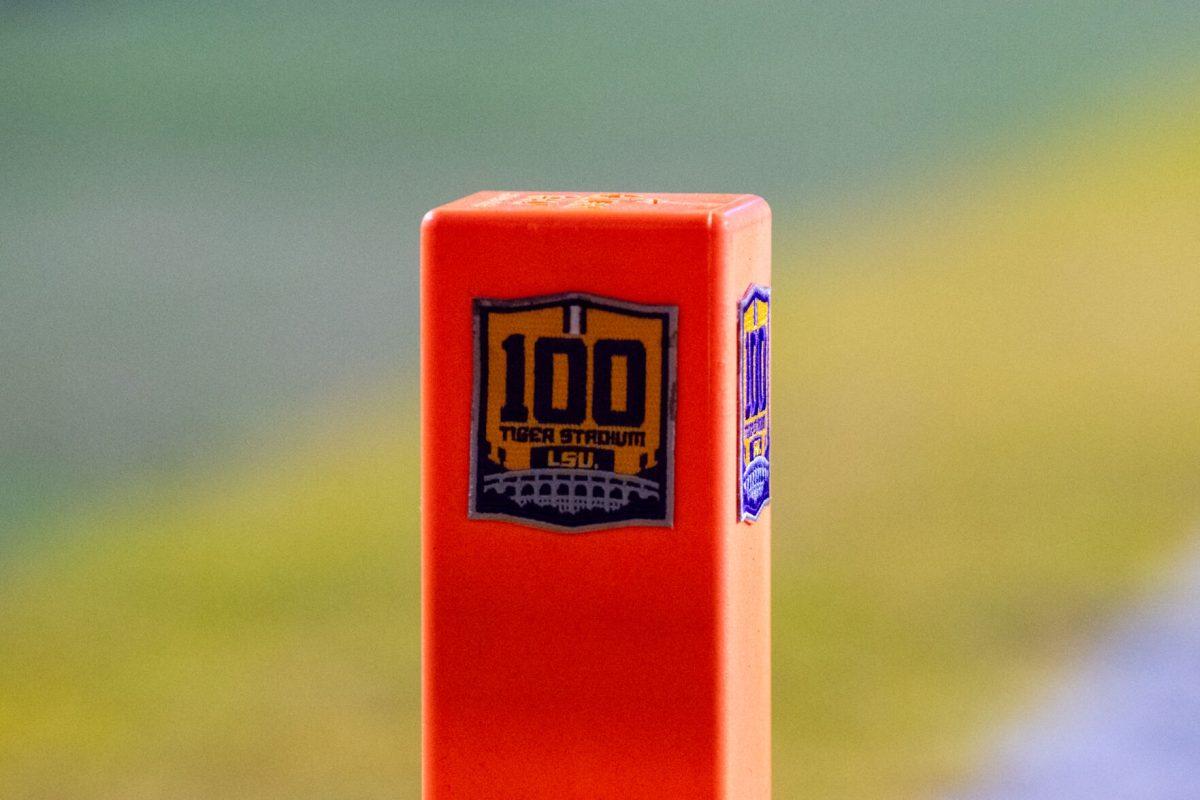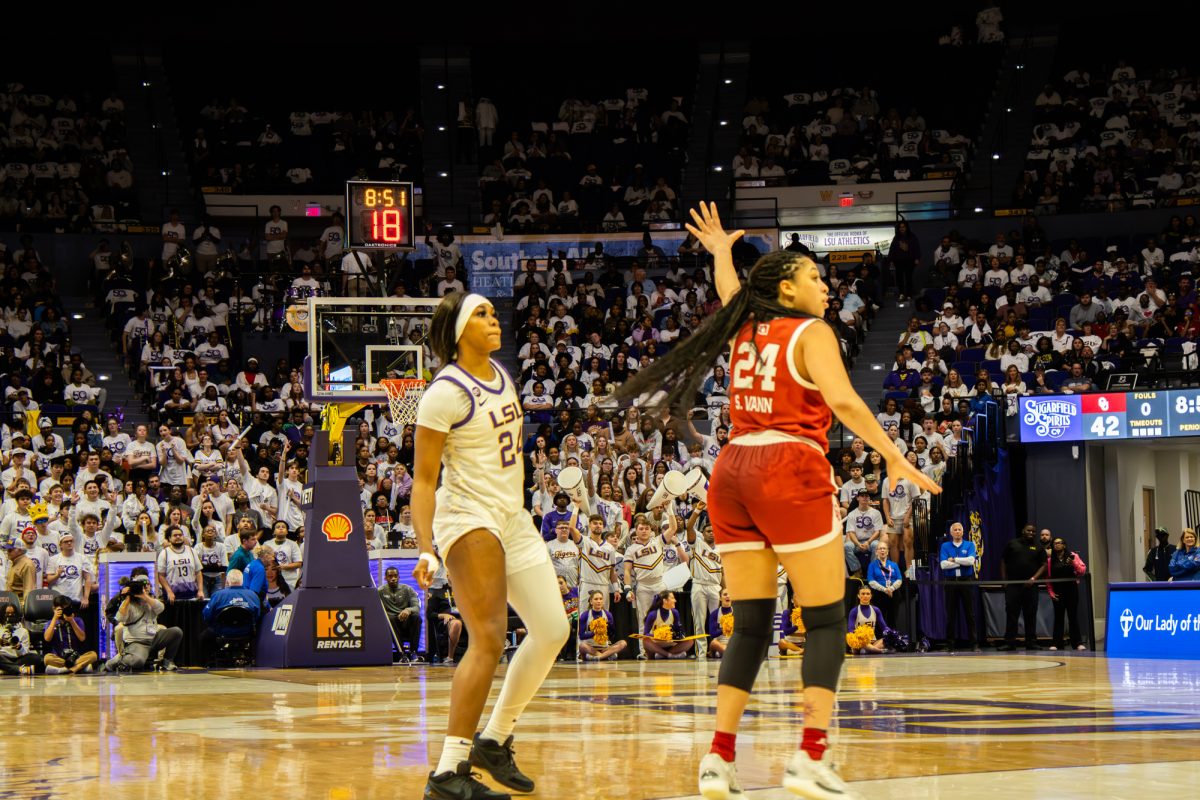It was a cold, rainy night in Baton Rouge.
LSU was in a thriller of a game against Texas A&M with bowl eligibility on the line. However, that was far from the main talking point. After parting ways with Ed Orgeron back in October, LSU’s search for its next head coach came to a head with a decision expected to be made the next day.
After some last-minute twists, the official decision came on Monday evening. Brian Kelly would be the next head football coach at LSU.
Bringing in Kelly was the first sign of an attempt to change the culture around LSU football. Gone are the days of sideshow acts like Orgeron and Les Miles leading the program, with LSU looking for someone who could be the face of the program in a more respectable way.
Both coaches had a tendency to draw attention to themselves for often the wrong reasons. And the antics like eating grass and heckling opposing fans were the tip of the iceberg of deep-rooted issues that have left a black cloud hanging over the program.
Most need no reminding of the years of sexual misconduct and Title IX mishandling brought to light in a USA Today investigation in 2019 and the subsequent years of internal and independent reviews and audits to try to remedy large-scale institutional messes.
Kelly was brought in partly as an attempt to fix those recurring issues.
Kelly himself is no stranger to controversy. Just last season he caused a bit of a PR blow up after some comments in an on-field interview following Notre Dame’s matchup with Florida State.
“I’m in favor of execution, maybe our entire team needs to be executed after tonight,” is what Kelly said after a frustrating, narrow win.
That was his most recent incident, but far from the biggest controversy during his time in South Bend. In 2010, a student videographer died after the lift he was on fell over due to high winds. This was the same year a Notre Dame player was accused of sexually assaulting a freshman at nearby St. Mary’s College. She died by suicide just 10 days after filing a complaint.
Then in 2018, Notre Dame was ordered to vacate wins by the NCAA from the 2012 and 2013 seasons after it was discovered a student-trainer had completed academic coursework for two Notre Dame players and provided impermissible academic benefits to another six.
To succeed at healing a broken program at a broken university, Kelly needs to leave that behavior behind him.
Fast forward to now, the Orgeron era feels like a lifetime ago and Kelly has already made waves despite not leading his team onto the field yet.
Much like any new coach, there were questions, doubts and concerns, but also plenty of promise. His resume spoke for itself, but the biggest question was how he would adapt to coaching in the SEC and in Louisiana.
Though Orgeron had a plethora of issues during his time at LSU, he was still loved by many around the state because of his roots. If you were to personify everything that is Louisiana football culture, Orgeron is probably what you’d come up with. A tough-talking, true Cajun man, he had the ability to relate to fans, local recruits, high school coaches and the rest of the community better than just about anyone.
Kelly is fundamentally different from Orgeron. An Irish-Catholic politician from Massachusetts, many questioned how Kelly would fit in at all in a place like South Louisiana. But when looking at the most successful coaches in LSU history, being from Louisiana is not exactly a requirement.
In the modern era of LSU athletics, there are two names that have changed the fabric of the athletic department. Those two names are Nick Saban and Skip Bertman. In their respective sports, both coaches completely turned their programs around, despite neither being from Louisiana.
Bertman was hired as LSU’s head baseball coach in 1984 after spending his playing career and the early part of his coaching career in Miami. An outsider at first, that quickly changed when in 1985 he took LSU to the postseason for the first time in 10 years, and then six years later brought the program’s first national championship back to Baton Rouge.
By the time Bertman retired as head coach in 2001, LSU had five national championships and was now one of the premier programs in college baseball. Bertman then served as Director of Athletics for the next seven years, further cementing himself as arguably the most iconic figure in the history of LSU athletics. He did all of this as an outsider to the state and community, you can become a perfect culture fit once the wins start coming.
Nick Saban was further proof. A man born and raised in West Virginia who had never coached or played outside the Midwest came to Baton Rouge and made LSU Football what it is today. Now 22 years removed from when he was hired at LSU, he is the greatest coach in the history of the sport.
A big part of Saban’s legacy and how he reached those peaks is his leadership both on and off the field. While Saban does come off as brash and hotheaded, he should receive some credit for the leadership he exhibited in 2020 during a heated time for the Black Lives Matter movement.
He stood by his players and showed the compassion his team and program needed. Meanwhile, LSU’s coach at the time showed no such leadership, further fracturing the locker room.
With the current social climate at LSU and around the country, Kelly needs to seize the opportunity to be not just a successful coach, but a moral coach.
All of this goes to say that for Kelly, the blueprint has already been laid out for him. The last three head football coaches have won national championships at LSU, despite the last two being far from championship-caliber coaches. At a place like LSU, winning is simply in the water.
Looking at the first seven months Kelly has spent in Baton Rouge, the foundation is already being laid. He brought in a staff both with experience at the highest level, and coaches with strong connections to Louisiana.
Just looking at the last few weeks, that is already paying dividends on the recruiting trail. In a state rich with football talent and no real in-state competitors, being able to recruit all the best players in Louisiana is crucial at LSU. Though Orgeron had his shortcomings in other areas, his ability to recruit the state is one of the reasons he was able to reach the ultimate prize.
Kelly himself may not have deep ties to these communities and high schools across the state, but he has already done a good job of filling his staff with coaches who do.
He has brought in a standard of accountability and a message of graduating champions. Were there talented players who left the program during the transition? Of course that is bound to happen, but it’s a sign of a new standard being set.
To build a championship program, you have to create a positive culture and put an emphasis on player development, both on and off the field. Setting that standard starts from the top.
There is a reason why a team led by a man who had no issue heckling fans and taking pictures in bed with women half his age had problems with culture. That is a big reason as to why Kelly is a breath of fresh air to many LSU fans. Though he may not be fist pumping and high-fiving fans during the tiger walk, he also isn’t the type of person to have a new tabloid headline written about him each week.
Nothing is guaranteed in the SEC though. Even Saban struggled early on both at LSU and Alabama. It’s unlikely LSU will compete for championships this year, and for 2022, that isn’t the expectation. However, when you coach at LSU, winning championships is the standard. It may take time for Kelly, and there is no guarantee that it does work out like many hope.
In both his own career and in the history of LSU football there are plenty of examples of what to do and what not to do.
How Kelly follows these examples will define his legacy at LSU.










